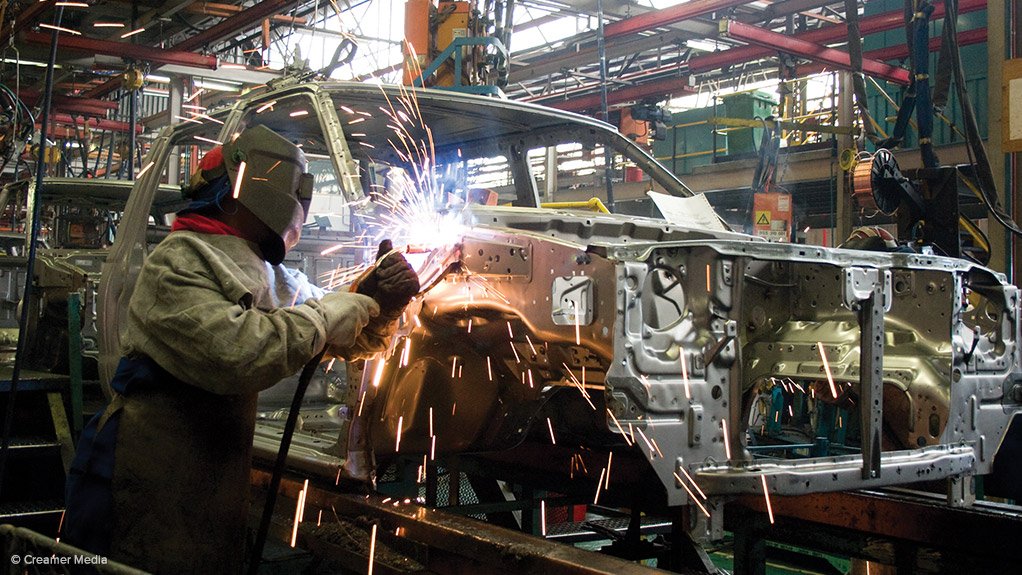Localisation, beneficiation must be cognisant of global value chains


MANUFACTURING South Africa’s manufacturing stimulation policies must be cognisant of global value chain opportunities and risks
Photo by Duane Daws
South Africa’s industrial policies might be ignoring the importance of global value chains. The industry should focus on realistic competitive advantages, which might allow for the sustainable production of intermediate goods that dovetails with multinational, globalised supply chains.
This is one of the messages arising from North-West University’s (NWU’s) trade and development research entity roundtable held last month.
“Products are being designed, manufactured, assembled and distributed in different countries – a process known as ‘slicing up the value chain’. Yet, South Africa’s industrial policy aims to beneficiate raw materials and stimulate manufacturing that is labour intensive.
“Such a policy stance suggests a centralised production approach, which is out of sync with the move towards focusing on those elements of the value chain that deliver realistic competitive advantages,” says NWU World Trade Organisation chair and trade and development research entity head Professor Wilma Viviers.
Further, services hardly feature in the country’s trade policy, even though they play a significant role when global value chain participants attempt to upgrade to higher value-added production, either upstream or downstream, from fabrication, she notes.
However, devising an export promotion strategy could become complicated when significant multinational corporations are involved in the target sectors because these organisations will decide how and where to sell, says University of Antwerp international trade economist professor Ludo Cuyvers.
“The dominant role played by multinational corporations in global value chains has advantages and disadvantages because, while they generate capital, expertise and influence in global markets, they also have a tendency to come and go, and do not always build skills on the ground in their host countries.
“There is also the risk that multinational corporations will add lower-value ‘slices’ (portions of intermediate goods manufacturing) of global value chains, which reduce the ultimate economic benefits derived from global value chain participation,” he explains.
South Africa can be justifiably proud of its automotive industry, which has successfully linked production by foreign subsidiaries and domestic components manufacturers, as well as technology transfer, within a globally connected value chain, says NWU trade and development research entity extraordinary professor Peet Strydom.
“Cooperation with multinational corporations has been fundamental to the South African automotive industry’s success to date. However, a country needs to be in good shape at the macroeconomic and microeconomic levels to take advantage of the opportunities offered by global value chains.
“South Africa’s performance is lacklustre in this regard. Whether you like it or not, global value chains are driven by multinationals,” he notes.
Government and the private sector in South Africa need to work towards gaining a better understanding of each other’s concerns about the economy and trade so that they can achieve greater consensus on the way forward together, concludes Viviers.
Article Enquiry
Email Article
Save Article
Feedback
To advertise email advertising@creamermedia.co.za or click here
Press Office
Announcements
What's On
Subscribe to improve your user experience...
Option 1 (equivalent of R125 a month):
Receive a weekly copy of Creamer Media's Engineering News & Mining Weekly magazine
(print copy for those in South Africa and e-magazine for those outside of South Africa)
Receive daily email newsletters
Access to full search results
Access archive of magazine back copies
Access to Projects in Progress
Access to ONE Research Report of your choice in PDF format
Option 2 (equivalent of R375 a month):
All benefits from Option 1
PLUS
Access to Creamer Media's Research Channel Africa for ALL Research Reports, in PDF format, on various industrial and mining sectors
including Electricity; Water; Energy Transition; Hydrogen; Roads, Rail and Ports; Coal; Gold; Platinum; Battery Metals; etc.
Already a subscriber?
Forgotten your password?
Receive weekly copy of Creamer Media's Engineering News & Mining Weekly magazine (print copy for those in South Africa and e-magazine for those outside of South Africa)
➕
Recieve daily email newsletters
➕
Access to full search results
➕
Access archive of magazine back copies
➕
Access to Projects in Progress
➕
Access to ONE Research Report of your choice in PDF format
RESEARCH CHANNEL AFRICA
R4500 (equivalent of R375 a month)
SUBSCRIBEAll benefits from Option 1
➕
Access to Creamer Media's Research Channel Africa for ALL Research Reports on various industrial and mining sectors, in PDF format, including on:
Electricity
➕
Water
➕
Energy Transition
➕
Hydrogen
➕
Roads, Rail and Ports
➕
Coal
➕
Gold
➕
Platinum
➕
Battery Metals
➕
etc.
Receive all benefits from Option 1 or Option 2 delivered to numerous people at your company
➕
Multiple User names and Passwords for simultaneous log-ins
➕
Intranet integration access to all in your organisation

















